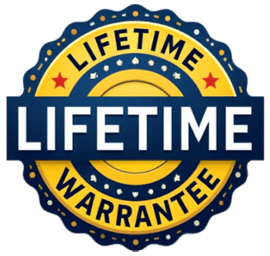

What Kinds of Water Treatment Equipment Does Your Home Need?
Clean, safe drinking water isn’t just a luxury—it’s essential for your family’s health and wellbeing. Yet many Florida homeowners face unique challenges when it comes to water quality. From chlorine taste and odor to hard water deposits, contaminants from agricultural runoff, and even microbiological concerns, the water flowing through your taps might not be as pure as you’d like.
At Aqua Pure Solutions, we understand that navigating the world of water treatment equipment can feel overwhelming. With numerous options available, how do you determine which systems your home truly needs? The answer depends on your specific water concerns, household size, and budget considerations. Let’s explore the comprehensive lineup of water treatment solutions that can transform your home’s water quality and provide peace of mind for years to come.
Understanding Your Water Quality Challenges
Before investing in any water treatment equipment, it’s crucial to identify exactly what’s in your water. Florida’s unique environment presents several common water quality issues that homeowners frequently encounter.
Municipal water supplies, while generally meeting safety standards, often contain chlorine used for disinfection that leaves an unpleasant taste and odor. Well water may contain iron, causing reddish-brown staining in fixtures, or sulfur, resulting in that unmistakable “rotten egg” smell. Hard water, containing excessive calcium and magnesium, leads to scale buildup on appliances and reduces the effectiveness of soaps and detergents.
More concerning contaminants might include heavy metals, pesticides, nitrates, or even microbiological threats that pose genuine health risks. The first step toward cleaner water is understanding exactly what you’re dealing with.
Professional water testing provides a comprehensive analysis of your water composition, revealing both visible and invisible contaminants. This crucial information serves as the foundation for selecting the appropriate water treatment equipment for your specific needs.
Inline Carbon Filters: The First Line of Defense
For homeowners concerned about chlorine taste and odor in their water, inline carbon filters offer an effective and economical solution. These versatile systems utilize activated carbon to attract and trap chlorine, organic compounds, and certain chemicals through a process called adsorption.
Inline carbon filters can be installed at various points in your home’s water system. Whole-house models treat all water entering your home, ensuring every tap delivers chlorine-free water. Point-of-use options can be installed under specific sinks or connected to refrigerator water lines to improve drinking water quality where it matters most.
The porous structure of activated carbon provides an enormous surface area for contaminant removal. As water passes through the filter, unwanted substances adhere to the carbon surface while clean water continues to flow. This process not only improves taste and odor but can also remove certain volatile organic compounds (VOCs) and some heavy metals.
Maintenance requirements for inline carbon filters are relatively minimal, typically requiring cartridge replacement every 6-12 months depending on water usage and contamination levels. This makes them an accessible starting point for homeowners looking to improve their water quality without significant investment or complicated installation.
Water Softeners: Conquering Hard Water Challenges
Hard water is a common issue throughout Florida, leaving telltale signs like spotty dishes, soap scum buildup, and reduced appliance efficiency. Water softeners specifically target this problem by removing calcium and magnesium minerals through an ion exchange process.
The heart of a water softener system is a resin bed containing tiny beads charged with sodium ions. As hard water flows through this resin, the calcium and magnesium ions are attracted to the beads and exchanged for sodium ions. The result is softened water that prevents scale formation and allows soaps to lather properly.
Installing a water softener delivers numerous benefits throughout your home. Appliances like water heaters, washing machines, and dishwashers operate more efficiently and last longer without mineral buildup. Plumbing fixtures remain free from scale deposits, and you’ll notice softer skin and hair after bathing in treated water.
Modern water softeners feature automatic regeneration cycles that flush accumulated minerals from the resin bed and replenish the sodium supply. This self-maintaining aspect makes them convenient for busy households. While initial installation requires professional expertise, ongoing maintenance is typically limited to periodically adding salt to the brine tank.
Reverse Osmosis Systems: Premium Drinking Water Quality
When it comes to producing the absolute highest quality drinking water, reverse osmosis (RO) systems stand in a class of their own. These sophisticated filtration systems remove up to 99% of dissolved contaminants, including those that other filters might miss.
The reverse osmosis process works by forcing water through a semi-permeable membrane with microscopic pores that allow only water molecules to pass through. Contaminants like lead, arsenic, fluoride, nitrates, and even some pharmaceuticals are blocked and flushed away. Most RO systems incorporate multiple filtration stages, including pre-filters to remove sediment and carbon filters to address chlorine and organic compounds.
Typically installed under the kitchen sink, RO systems provide purified water through a dedicated faucet. The multi-stage filtration process ensures exceptional water quality for drinking and cooking purposes. Some homeowners choose to connect their RO systems to refrigerator water dispensers and ice makers for comprehensive coverage.
While RO systems produce unmatched water quality, they do operate more slowly than conventional filtration and require adequate water pressure to function properly. The filtration process also generates some wastewater during operation. However, for households prioritizing premium drinking water quality, the benefits far outweigh these considerations.
UV Sterilizers: Invisible Protection Against Microorganisms
Even visibly clear water can harbor invisible threats in the form of bacteria, viruses, and other microorganisms. UV sterilizers provide a powerful defense against these biological contaminants without adding chemicals or altering water taste.
UV sterilization works by exposing water to ultraviolet light as it flows through a specialized chamber. This high-intensity light penetrates the cell walls of microorganisms, disrupting their DNA and rendering them unable to reproduce or cause infection. The process is remarkably effective, eliminating up to 99.99% of harmful pathogens.
Unlike chemical treatments, UV sterilization leaves no residual substances in your water and doesn’t create harmful byproducts. The system operates continuously, providing constant protection against waterborne diseases. UV sterilizers are particularly valuable for homes with private wells, where water isn’t pre-treated by municipal facilities.
For maximum effectiveness, UV sterilizers are typically installed after other filtration systems have removed particles that might otherwise shield microorganisms from the UV light. The combination of filtration and UV treatment creates a comprehensive barrier against both physical and biological contaminants.
Custom Solutions for Well Water Challenges
Well water presents unique treatment challenges that often require customized approaches. Unlike municipal water, well supplies aren’t regulated or pre-treated, meaning homeowners must address any quality issues independently.
Iron contamination, causing rusty stains and metallic taste, requires specialized iron removal systems. These typically use oxidation followed by filtration to convert dissolved iron into particles that can be captured and removed. For sulfur problems causing that distinctive “rotten egg” odor, oxidation systems or specialized sulfur-reducing media offer effective solutions.
Tannins, organic compounds that give water a tea-like color, require specialized treatment through anion exchange or membrane filtration. Acidic water, which can corrode plumbing and fixtures, may need neutralizing filters containing calcite or similar pH-adjusting media.
Aqua Pure Solutions specializes in analyzing well water composition and designing custom treatment systems that address multiple contaminants simultaneously. These integrated solutions ensure comprehensive water quality improvement while optimizing system efficiency and maintenance requirements.
Salt-Free Water Treatment: An Alternative Approach
For homeowners concerned about adding sodium to their water or those seeking low-maintenance alternatives to traditional softeners, salt-free water treatment systems offer an intriguing option. While not technically “softeners,” these systems prevent hard water damage through different mechanisms.
Salt-free systems typically use template assisted crystallization (TAC) technology that transforms dissolved calcium and magnesium into microscopic crystals that remain suspended in water rather than forming scale deposits. The minerals remain in the water—beneficial for drinking purposes—but lose their ability to adhere to surfaces.
The advantages of salt-free treatment include zero water waste, no electricity requirements, and minimal maintenance needs. These systems don’t require regeneration cycles or salt additions, making them environmentally friendly and convenient. They’re particularly suitable for homes in areas with water restrictions or where traditional softener discharge is prohibited.
It’s important to understand that salt-free systems don’t actually “soften” water in the technical sense—they don’t remove minerals but rather change their behavior. While they effectively prevent scale formation in plumbing and appliances, they may not provide all the aesthetic benefits of true softened water, such as improved soap lathering.
Creating an Integrated Water Treatment Strategy
Most homes benefit from combining multiple water treatment technologies to address different aspects of water quality. Rather than viewing these systems as separate entities, consider how they work together to create comprehensive water quality improvement.
A typical whole-house solution might begin with sediment filtration to remove particles, followed by carbon filtration to address chlorine and organic compounds. A water softener or salt-free system then manages hardness minerals, while point-of-use RO systems provide premium drinking water quality. UV sterilization can serve as a final safeguard against microbiological contaminants.
Aqua Pure Solutions specializes in designing integrated water treatment strategies tailored to your specific water quality challenges, household size, and budget considerations. Our experts analyze your water composition, understand your priorities, and recommend the optimal combination of technologies to achieve your water quality goals.
With professional installation and regular maintenance, your integrated water treatment system will provide years of reliable service, delivering clean, safe, great-tasting water throughout your home.
Conclusion
Investing in the right water treatment equipment is one of the most important decisions you can make for your home and family’s wellbeing. From basic chlorine removal to comprehensive purification systems, today’s water treatment technologies offer solutions for virtually any water quality challenge.
Aqua Pure Solutions provides expert guidance through every step of the process, from initial water testing to system design, professional installation, and ongoing maintenance. Our comprehensive lineup of water treatment equipment ensures that whatever your water concerns, we have the expertise and technology to address them effectively.
Don’t compromise on your water quality. Contact Aqua Pure Solutions today to discover the perfect water treatment solution for your home.
